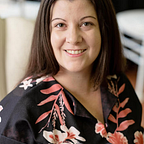Seek Immediate Professional Help
“When you reach the point that you want to leave medicine, is that when it’s called burnout?” my student asked me as we waited for the elevator to take us to our next patient on rounds.
I explained burnout as a combination of exhaustion and depersonalization in much the same tone as I would teach the management of a patient with uncomplicated diverticulitis. Then I concluded, “I took a burnout measurement tool myself, and my results scored me in the ‘seek immediate professional help’ category.”
My team stood quietly for a moment.
“Well, did you? Seek professional help?” my student was brave enough to ask.
“Yes,” I admitted, “ I started going to therapy after working so much time in the Covid unit.”
My honesty about my use of therapy surprises me. The culture of medicine has always been a culture of silence. I can’t pinpoint where I learned there was no place for emotion in medicine during my education. Still, I can vividly recall waiting until I arrived home from the hospital to cry after being openly mocked and embarrassed by a surgical resident during my clerkship. Showing emotion was considered a sign of weakness. Admitting to mental health struggles would be potentially devastating to a career.
Then Covid happened, and I could no longer pretend that I could watch multiple patients die in a single day and be okay. I watched colleagues unable to suppress the tears that came when a patient was about to be intubated, tears that sprang from the knowledge that they were unlikely ever to come off the ventilator.
I worked 12+ hour shifts, repeatedly donning and doffing personal protective equipment and running to cardiac arrests. My physical energy was spent. My emotional energy was equally exhausted, telling patient after patient that they may not survive and calling a dozen families a day with bad news. After a particularly terrible patient encounter in which a patient told me I was stupid and pushed me away as I tried to explain what we needed to do to save his life, I knew I had crossed into the depths of burnout.
That led me to a support group called the Things They Carry Project. This project offers free writing workshops to healthcare workers led by writers and trained psychotherapists. During each session, participants have time to write about their experiences as healthcare providers during Covid and share those writings with the group. As someone who had never engaged with support groups or therapy before but identified as a writer, this setting was the perfect way to start processing my experiences and the emotions they’ve created from my time on the frontline.
Since my time with the project, I’ve moved on to more traditional forms of therapy. There are still physically exhausting days, but my emotional reserve no longer categorizes me as “seek immediate professional help.”
